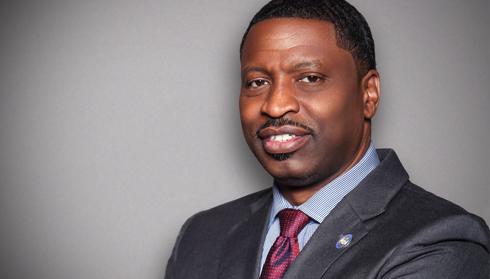NAACP: Fighting to End Racism and Economic Inequality

NAACP: Fighting to end racism and economic inequality
‘Viewpoints’ invites guest authors from outside of Wells Fargo to share an important perspective related to their work. Today, we welcome Derrick Johnson, president and CEO of the NAACP.
Founded in 1909, the NAACP is the nation’s premier civil rights organization. Our members, throughout the United States and the world, are the leading advocates for civil rights in their communities.
As the NAACP’s president and CEO, I’m proud to serve our 2,200 branches in their efforts on voting rights, political representation, quality public education, affordable health care, public safety, criminal justice, and other issues critical to the well-being of African American communities.
Economic development is a ‘game changer’The NAACP has six strategic Game Changers for 21st century advocacy, and at the top of that list is economic sustainability. The NAACP believes that everyone deserves a chance to live the American dream and seeks to build a nation in which everyone has equal opportunity to achieve economic success, sustainability, and financial security.
In service of this mission, the NAACP Economic Department works to enhance the capacity of African Americans and other underserved groups through financial education; individual and community asset-building initiatives; diversity and inclusion in business hiring, career advancement, and procurement; and monitoring financial banking practices.
With the support of civic-minded organizations like Wells Fargo, our Economic Department develops and implements programs to promote minority entrepreneurship and business development and to address poverty, unemployment, and barriers to affordable housing.
The path toward economic inclusionOn Feb. 6, the NAACP released its Economic Inclusion Plan reports, spotlighting systematic economic inequity in three American cities that have recently confronted community frustration and social unrest following incidents of police violence. Our reports identify long-term deficits in responsible, equitable public policy as an underlying cause of poor police-community relations and other factors that affect a city’s ability to prosper. Now that the cameras and the nation’s attention are gone from the streets of Ferguson, Missouri; Baltimore, Maryland; and Charlotte, North Carolina, it is up to us to identify and implement structural solutions.
Funded by Wells Fargo, the NAACP’s Economic Inclusion Plans are a critical resource for residents, elected officials, and members of the community to address racial discrimination with economic policy and programmatic solutions. The reports are a product of diligent, academic research, but they are also a community creation. The NAACP state conferences and local branches held town halls and listening sessions in each city, heard testimony regarding the economic conditions of the black community, and recorded recommendations to address individual and family needs.
In the age of fake news, our reports share hard truths: The poverty rate for black Americans is more than double that of whites. Black children are almost three times as likely as white children to live in poverty. The rate of unemployment for black Americans is more than double that of whites. The homeownership gap between white and black Americans is greater than 20 percent, and the business ownership gap is nearly 70 percent.
Each of our reports tells a tale of two cities. Black residents of Baltimore, Charlotte, and St. Louis have long endured segregated schooling, biased law enforcement, limited job prospects, and voter disenfranchisement. Long histories of “separate and unequal” practices have crippled the vitality of these communities.
But, while our reports expose discouraging data, they also include concrete recommendations for immediate progress. Armed with our findings and supported by Wells Fargo, the NAACP will continue to advance an agenda that prioritizes homeownership and employment opportunities, the growth of black enterprise, and working together to produce job opportunities as well as the establishment and maintenance of a truly diverse workforce. We hope that you will join us.
Viewpoints is a forum for guest authors to share important insights and perspectives. For more Viewpoints and other stories about how Wells Fargo is helping to make our communities better, please visit Wells Fargo Stories at https://stories.wf.com/?cid=intpart_wfs_3bl_1801_0.

